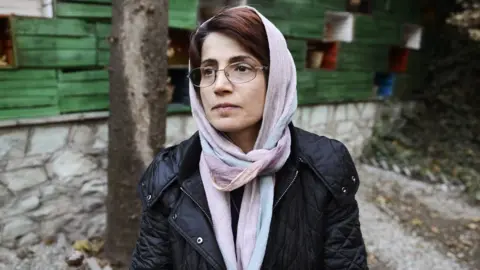Armita Geravand: Iran rights activist held at metro death teen's funeral
 Getty Images
Getty ImagesLeading Iranian human rights activist Nasrin Sotoudeh has been violently arrested at a funeral of a teenage girl who died after an alleged altercation with morality police, her husband says.
Reza Khandan told BBC Farsi his lawyer wife was taken by security forces to a detention centre near Tehran on Sunday,
Armita Geravand, 16, collapsed on a Tehran metro train on 1 October.
Activists accused morality police of assaulting her for not wearing a hijab, but authorities insisted she fainted.
Armita died on Saturday after "suffering from brain damage", state media said.
 IRNA
IRNAMany Iranians have drawn parallels with the case of Mahsa Amini, a young woman who died in custody in September 2022 after being detained by morality police in Tehran for allegedly wearing her hijab "improperly".
Anti-government protests, which are still taking place, erupted across the country when Amini died after three days in a coma. Hundreds of people have been killed and thousands detained in a violent crackdown by security forces.
Mr Khandan told BBC Farsi that his wife and a number of other people were arrested during Sunday's funeral near the capital.
Ms Sotoudeh, 60, has represented a number of women arrested for appearing in public without covering their hair.
In recent years, she has been arrested and charged several times.
Mr Khandan also said that among those detained on Sunday was Manzar Zarrabi, who lost several family members when a Ukrainian passenger plane was shot down by Iran's Islamic Revolutionary Guard Corps (IRGC) shortly after take-off at Tehran airport in 2020.
Mr Zarrabi's son Alborz Sadeghi wrote on X, formerly known as Twitter, that his mother was "severely beaten" before her arrest.
Iranian authorities have not publicly commented on the reported beatings and detentions.
However, the country's Fars news agency, which is linked to the IRGC, reported that Ms Sotoudeh "had been arrested and handed over to judicial authorities" for "not wearing a headscarf" and "disturbing society's mental security".
Covering the head in public has been compulsory for women in Iran following the 1979 Islamic revolution.